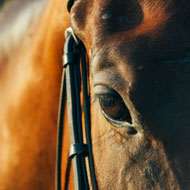First stem cell-based veterinary medicine approved

“A quarter of the entire equine population develops osteoarthritis at some point in their life."
The first stem cell-based veterinary medicine, used for treating equine lameness, will be available from May and June 2019.
Boehringer Ingelheim has launched Arti-Cell Forte in Europe for the ‘reduction of mild to moderate recurrent lameness associated with non-septic joint inflammation in horses’.
Described as a ‘groundbreaking first-ever approved treatment’, the drug targets lameness by utilising specifically primed, chondrogenic induced stem cells. It comes in an ultra-low frozen and ready-to-use format.
Boehringer said current treatments for lameness are not satisfactory for all cases and ‘there is a clear need for innovation and new treatment options’, looking at the underlying cause rather than just treating symptoms.
The company formed a partnership with Global Stem Cell Technology (GST) last year to develop new treatments and solutions to improve animal health.
Jan Spaas, CEO of GST, said: “A quarter of the entire equine population develops osteoarthritis at some point in their life. Priming the cells towards cartilage aids them to deliver the right activities in the affected joint.
“We are absolutely delighted with our first marketing authorisation from the European Commission and the first stem cell-based product in animal health. We are sure that with our partner Boehringer Ingelheim this product will become a game changer in equine health.”
Dr Erich Schoett, of Boehringer, added: “We are proud to continue to set new standards of care for horses to optimise their health and well-being in partnership with veterinarians. Early disease detection and early treatment are key to ensure that horses are healthy and live longer, happier lives.”



 The RCVS has announced a new version of its 1CPD mobile app, with enhanced features for veterinary surgeons and veterinary nurses to record their continuing professional development.
The RCVS has announced a new version of its 1CPD mobile app, with enhanced features for veterinary surgeons and veterinary nurses to record their continuing professional development.